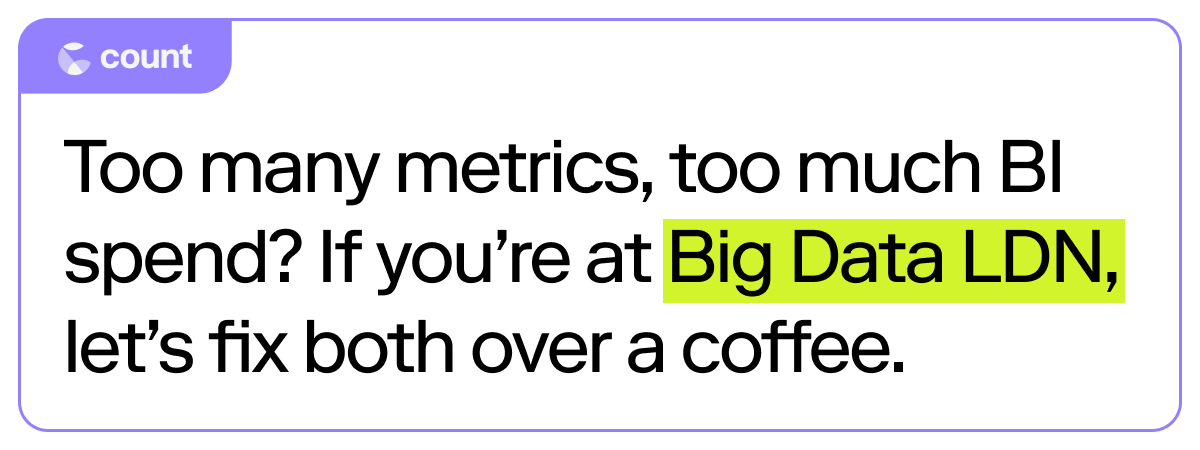
READ TIME: 5 MINUTES
In partnership with Count.co - check them out, they’re wonderful👇🏻

Companies like Moonpay, Runa, and Bumble tackled data chaos by mapping out their business in a metric tree and and identifying what actually drives growth (not just what looks good on a dashboard).
Want to build out something similar? Book in 15 minutes here and we can sketch it out together - or come see us at Big Data London next month, we're at booth G40.
💪🏻 Soft skills are anything but.
Let’s stop pretending…
The moment you call something a “soft skill”, you’ve already told yourself it’s optional. A nice-to-have. Something you’ll work on once you’ve finished doing the “real” work.
But the truth in leadership: the “real work” isn’t writing SQL, fixing pipelines, or building dashboards.
→ It’s building trust.
→ It’s gaining influence.
→ It’s moving people and strategy in the right direction.

Be more like this guy, I guess…
That’s why I call them engagement skills and they’re anything but soft:
Knowing exactly how your business makes money and keeps shareholders happy
Talking so people give a damn and actually listen
Negotiating to get things over the line without losing influence
Fighting for your people and for what you believe in
Creating a movement based on facts and data, not some bloated bureaucrat’s gut feel
These are the real hard skills.
Not typing SELECT * on repeat or colouring in dashboards like a 5 year old.
Oh, and here’s your wake-up call:
AI will eat your so called “hard skills” long before it can touch your engagement skills.
If you want to stick around and be taken seriously, start building them now!
🗳️ Poll time!
What do you think is the most important skill set for a data leader to succeed today?
(don’t forget to check out last week’s poll results down below)
👩🏼💼 What counts as engagement skills?
Let’s get specific. Engagement skills are the abilities that make your presence in the room matter. They’re not “soft”. They take years to master, require constant situational awareness, and have the power to make or break your career.
You can’t learn these via a $50 Udemy course either - they take experience and very hard work to acquire.
Here’s what they look like when done well:
Business acumen
You can talk margin, market share, and shareholder expectations without fumbling for a buzzword.
You understand your company’s revenue levers and cost drivers better than half the finance team.
Communication that lands
You know how to frame insights so your audience cares.
You can hold a boardroom’s attention without drowning them in jargon or caveats.
Negotiation and influence
You can secure buy-in for initiatives without burning bridges.
You know when to stand your ground and when to let someone else take the win.
Advocacy for your people and priorities
You protect your team from low-value work that dilutes impact.
You escalate the right battles at the right time — and win.
Movement building
You can rally stakeholders around a shared vision that is anchored in evidence, not ego.
You make data-led thinking contagious across the organisation.
📋 Grab my free guide for data leaders
“The 5 Traps Keeping You Stuck” is now live. Check it out here.
🏋🏽 How to strengthen your engagement skills
If you’ve spent most of your career sharpening technical skills, building engagement skills might feel uncomfortable. But like any skill, you can train them with deliberate practice.
Here’s where to start:
Learn your business model inside out
Read your annual report, investor presentations, and industry analysis.
Understand exactly how your work influences revenue, cost, and risk.
Get closer to decision-makers
Sit in on non-data meetings and watch how decisions actually get made.
Pay attention to the language, metrics, and unspoken priorities in play.
Rehearse your message
Before key conversations, practise explaining your point in two clear sentences — no jargon, no hedging.
Ask a non-data colleague to repeat back what they heard. If it’s not close, try again.
Train your negotiation muscle
Start small — negotiate timelines, resources, or scope.
Study proven frameworks like BATNA and anchoring so you can negotiate strategically, not emotionally.
Invest in relationships before you need them
Help stakeholders achieve their goals in ways that also advance yours.
Build political capital that you can spend when the stakes are high.
The data leaders who will thrive in the next decade won’t be the ones who can code faster.
They’ll be the ones who can make people care, make people move, and make change stick.
Stop calling them soft skills.
Start treating them as the hardest skills you’ll ever master.
🚨 Massive summer sale on DIY coaching🚨
It’s August so that means it’s time for my massive summer sale!
I’m announcing 50% off on my DIY coaching product using coupon code: AUGUST50 at checkout.
If you’ve always wanted to experience coaching but struggle with the price tag, then this product is for you.
Unlock your potential with DIY Coaching for Data Careers. This self-paced email series and accompanying exercises provides actionable tools to help data professionals navigate career transitions, set goals, and achieve success.
Click here to check it out
⚡️ Previous poll results
Last week, I asked you: how often do you think about escaping the 9 to 5 and building something of your own?
Here’s how you responded:


Tristan Burns
💡 Helpful resources for data professionals:
The Data Leadership Frameworks: This email series containing 10 data leadership frameworks, will equip you with the necessary skills and knowledge to maximise your effectiveness and become the influential and powerful data leader you know you can be.
DIY Coaching Program: Through a series of 9 self-guided exercises, you’ll clarify your goals, overcome obstacles, and create a plan for your next career move - all at your own pace.
⚡️Three more ways I can help you:
Private Coaching for Data Leaders: I work with data professionals looking to grow into influential and unstoppable data leaders to help them navigate and overcome the challenges of being a data leader.
Group coaching for Data Teams: Great data teams can make or break businesses. Through my facilitated 6-week group coaching program, together we get to the heart of what is holding teams back and set a course for data-driven success.
Google Analytics, Tagging and Looker Support: Helping teams to set up or optimising their data eco system, generate actionable insights and gain more in-depth knowledge through training.
What did you think of this email?
If you enjoyed this newsletter, why not forward it to a friend.
Did someone forward you this email? You can subscribe to Strategies for Effective Data Leaders here!
